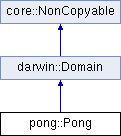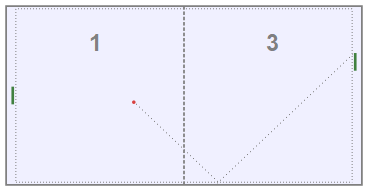Domain: The classic Pong game. More...
#include <pong.h>
Inheritance diagram for pong::Pong:

Public Member Functions | |
| size_t | inputs () const override |
| Number of inputs to a Brain. | |
| size_t | outputs () const override |
| Number of outputs from a Brain. | |
| bool | evaluatePopulation (darwin::Population *population) const override |
| Assigns fitness values to every genotype. More... | |
 Public Member Functions inherited from darwin::Domain Public Member Functions inherited from darwin::Domain | |
| virtual unique_ptr< core::PropertySet > | calibrateGenotype ([[maybe_unused]] const Genotype *genotype) const |
| Optional: additional fitness metrics (normally not used in the population evaluation, ie a test set) | |
Detailed Description
Domain: The classic Pong game.
This is an implementation of the classic 2-player Pong game: each player controlls a paddle (which can be moved up or down). The ball bounces off the walls, and if it goes behind the paddle line, the other player scores a point.

All the population members participate in a tournament and the outcomes are used to calculate the individual fitness values.
Inputs
| Input | Value |
|---|---|
| 0 | my_paddle_pos |
| 1 | opponent_paddle_pos |
| 2 | ball_x |
| 3 | ball_y |
| 4 | ball_vx |
| 5 | ball_vy |
Outputs
| Output | Value |
|---|---|
| 0 | move_up |
| 1 | move_down |
The largest output signal determines the player action at the current step. If none of the output values is larger than 0, then the default action is "do nothing".
Member Function Documentation
◆ evaluatePopulation()
|
overridevirtual |
Assigns fitness values to every genotype.
Having a good fitness function is a key part of evolutionary algorithms:
- Perhaps obvious, the fitness value should accurately estimate the quality of a particular solution
- A "smooth" distribution is preferable since it provides a gradient which can guide the incremental search in the solutions space. (ex. if most fitness values are 1.0 or 0.0 it's hard to know which genotypes are good candidates for reproduction)
- Returns
trueif the evolution goal was reached
Implements darwin::Domain.
The documentation for this class was generated from the following files:
- C:/Users/lemo/work/darwin/domains/pong/pong.h
- C:/Users/lemo/work/darwin/domains/pong/pong.cpp
 1.8.14
1.8.14